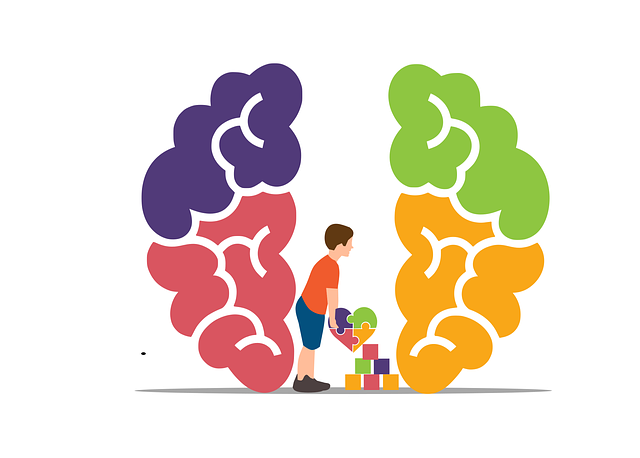Northglenn Terminal Illness Therapy centers utilize a multifaceted approach to analyze mental health data, combining structured surveys, clinical assessments, and online platforms for comprehensive insights. This enables personalized treatment plans, effective burnout prevention for healthcare providers, and the identification of valuable coping strategies. By prioritizing confidentiality, equity, and inclusive practices, these centers contribute to improved mental wellness outcomes, advanced Mental Health Education Programs, and reduced stigma through data-driven strategies.
Mental health data analysis is a powerful tool for understanding complex psychological trends. This article explores essential aspects, from Understanding Mental Health Data: examining collection methods and sources, to Data Analysis Techniques that unlock valuable insights. We delve into Interpreting Findings, identifying crucial patterns and trends shaping mental health care. A case study focusing on Northglenn Terminal Illness Therapy demonstrates practical applications. Additionally, we address Ethical Considerations vital for responsible data interpretation in the mental health field.
- Understanding Mental Health Data: Collection and Sources
- Data Analysis Techniques for Mental Health Insights
- Interpreting Findings: Identifying Patterns and Trends
- Northglenn Terminal Illness Therapy: A Case Study Approach
- Ethical Considerations in Mental Health Data Interpretation
Understanding Mental Health Data: Collection and Sources

Understanding Mental Health Data involves recognizing that it’s a multifaceted landscape encompassing various sources and methods. Collection begins with structured surveys and clinical assessments designed to capture symptoms, diagnoses, and treatment responses. These can be sourced from healthcare settings like Northglenn Terminal Illness Therapy centers, where professionals regularly document patient progress. Additionally, online platforms and mobile apps are increasingly providing access to mental health data through self-reported experiences and interactions with digital therapy tools.
Emotional Intelligence plays a crucial role in interpreting this data accurately. Professionals must consider not just the quantitative measurements but also the qualitative aspects, such as patient narratives and feedback on treatment effectiveness. This holistic approach is further enhanced by integrating Risk Management Planning for Mental Health Professionals, ensuring safety protocols are in place while handling sensitive data. Moreover, Mental Health Education Programs Design should equip practitioners with skills to interpret data effectively, thereby improving patient outcomes.
Data Analysis Techniques for Mental Health Insights

In the realm of mental health, data analysis serves as a powerful tool to uncover insights and drive evidence-based practices. By employing advanced statistical methods and machine learning algorithms, researchers can navigate complex datasets collected from various sources like clinical records, surveys, and wearable devices. This process allows for the identification of patterns and trends related to different mental health conditions, including terminal illness and burnout—a growing concern in healthcare. Techniques such as predictive modeling enable professionals to anticipate risks and intervene early, potentially improving patient outcomes.
For instance, Northglenn Terminal Illness Therapy centers can leverage data analysis to develop personalized treatment plans. By analyzing patient demographics, symptom severity, and treatment responses, therapists can tailor interventions. Additionally, Burnout Prevention Strategies for Healthcare Providers can be enhanced through data-driven insights. Stress Management Workshops Organization and Conflict Resolution Techniques, when informed by data, become more effective in addressing the unique challenges faced by mental health professionals.
Interpreting Findings: Identifying Patterns and Trends

When analyzing mental health data, particularly for conditions like terminal illness in Northglenn, Interpreting findings involves a meticulous process of identifying patterns and trends within the collected information. This step is crucial as it allows professionals to gain deep insights into the lived experiences of individuals battling these challenges. By carefully examining the data, therapists can uncover recurring themes, correlations, and outliers that may indicate specific areas for intervention or highlight effective coping strategies.
For instance, analyzing communication strategies employed by patients could reveal that certain approaches foster better support networks and enhance emotional well-being. Similarly, exploring trends in coping skills development might suggest activities or therapies that significantly reduce symptoms of depression among individuals facing terminal illness in Northglenn. This data-driven approach not only personalizes treatment plans but also contributes to evidence-based practices, ultimately aiming to improve overall mental health outcomes.
Northglenn Terminal Illness Therapy: A Case Study Approach

In the realm of mental health data analysis, case studies offer a powerful tool for understanding complex issues like terminal illness and its impact on individuals. Northglenn Terminal Illness Therapy provides an intriguing example, where experts utilize advanced communication strategies to aid patients in navigating their journey. By delving into such specific therapeutic approaches, researchers can gain valuable insights into effective treatment methods, especially when designing Mental Health Education Programs. These programs, often featured in the popular Mental Wellness Podcast Series Production, aim to educate and support both sufferers and caregivers.
Through this case study approach, professionals can identify key factors influencing patient outcomes, including communication techniques that foster a sense of comfort and understanding. By studying successful interventions like Northglenn’s, mental health practitioners can refine their strategies, ensuring personalized care tailored to individual needs. This analytical process is crucial in enhancing overall Mental Wellness and promoting positive discussions around terminal illness.
Ethical Considerations in Mental Health Data Interpretation

In the realm of mental health data analysis, ethical considerations are paramount, especially when interpreting information related to sensitive conditions like terminal illnesses. As Northglenn Terminal Illness Therapy centers collect and analyze data, they must navigate complex ethical landscapes. One key concern is ensuring client confidentiality and privacy. The data gathered, including personal details and therapeutic insights, requires strict protection to maintain trust and prevent unauthorized access.
Additionally, the interpretation of mental health data should promote equity and avoid perpetuating stereotypes or biased assumptions. It’s crucial to develop Mental Wellness Coaching Programs that leverage this data while considering the diverse nature of mental health experiences. Public Awareness Campaigns Development can also benefit from these insights, fostering a more empathetic society by challenging stigma and promoting understanding of various conditions, including terminal illnesses.
Mental health data analysis is a complex yet invaluable process, as seen through the lens of Northglenn Terminal Illness Therapy. By employing various data collection methods and analysis techniques, professionals can uncover significant patterns and trends that inform treatment strategies. Interpreting these findings ethically and accurately is crucial for improving mental healthcare outcomes. This article has explored key aspects, from understanding diverse data sources to navigating ethical considerations, highlighting the importance of rigorous data interpretation in shaping effective therapeutic approaches.














